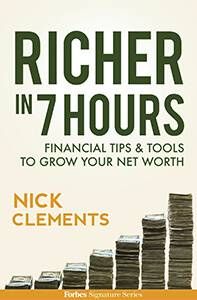How to Get Your Finances in Order in a Day
The author of 'Richer in 7 Hours' shows you how to do it
Every year, Americans vow to live financially healthier lives. After losing weight, one of the most popular New Year’s resolutions is to spend less and save more money. Unfortunately, most of those resolutions are quickly broken.
One reason, according to psychologists, is that people set vague or unrealistic goals and quickly give up once success looks impossible to achieve or even define. But what if I told you that you could get your financial house in order in a single day?
You can.
When people commit to spending less and saving more, they usually start by cutting out conspicuously expensive treats, like the clichéd daily latte. But rather than focusing on the superficial, most people really need to conduct a complete analysis of their financial situation.
The 4 Key Numbers
As I explain in my new ebook published by Forbes, Richer in 7 Hours (available for download on Amazon for $3.99 or free on Kindle Unlimited), the way to do it is to spend one day — what I call your “financial health day” — learning four numbers:
1. Your net worth (a number that will pay for your retirement) This is not just a number for the rich. Net worth — what you own minus what you owe — is the secret to a successful retirement.
Many Americans are broke and don’t even realize it. Rather than focusing on their net worth, they focus on getting through the month and making their payments on time. You’ll want to spend an hour on this number.

2. How much you add to (or subtract from) your net worth every month This is also known as your budget. Within your budget, you need to take a long hard look at your fixed expenses, your financial goals and your variable expenses separately. A few of my rules of thumb: You should try to save at least 15 percent of your gross income for retirement; no more than 50 percent of your net income should go towards fixed expenses; no more than 30 percent of your net income should go toward variable expenses and the remaining 20 percent should be for your financial goals (like getting out of debt or saving for college). Spend an hour on this number.
3. How much you need for retirement There are plenty of calculators that can help you determine how much money you need to make your retirement last (one of my favorites: the AARP Retirement Calculator). But you should do the math and understand how much you need and whether you have a deficit or surplus. It is this calculation that will determine how much you should be adding to your nest egg each month. This calculation becomes incredibly important in retirement. Spend an hour on this number.
4. How much money your dependents would receive if you died today If you don’t have dependents, you shouldn’t worry about life insurance. But if people are depending upon your income today, you need to ensure they are protected. And there are inexpensive ways to get that done, such as Zander Insurance, which can help you find the best rates for term life and disability coverage. Spend an hour on this number.
Sadly, most people don’t know any of those four numbers. (I have a confession to make; although I’m the co-founder of MagnifyMoney.com and recently ran Barclaycard’s credit card business in London, during the first seven years of my career, I didn’t know those numbers either because I was so focused on the present.)
Apps and Sites That Can Help
In Richer in 7 Hours, I lay out how to embark on one intensive day of action. Every one of those seven hours has an activity. And within each activity, there are tools and apps that can help you assess your situation, make a decision and automate your plan: a few of my favorite budgeting apps and websites are Level Money, Mint and Dave Ramsey’s EveryDollar. When you automate a decision, you are much more likely to keep the commitment throughout the year.
Aside from the four hours I’ve mentioned above, you’ll want to spend a total of three hours learning how to: get and understand your credit score (I recommend CreditKarma.com) and credit report (download the report for free from the three major credit reporting agencies at AnnualCreditReport.com; find savings in your budget; build a plan to eliminate debt as quickly as possible; know where to turn to for help and avoid getting ripped off.
If you want to live a financially healthier life but don’t know where to begin, this could be a day well spent. And it could be the first time you keep that resolution.

